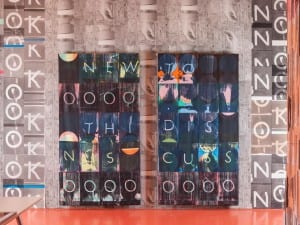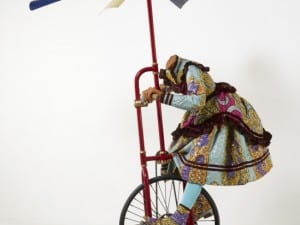before sleep at the end of love (description of a lullaby) is a contemporary opera devised by Sarah Hardie, which was performed at Bold Tendencies in London on 27 September. Her second major commission in England, the opera continues Hardie’s interest in relational dualisms: the self and the other, the reader and the storyteller, the inner and outer, as represented by the human voice. Performed in the multi-storey car-park venue at sunset, the multitude of voices are intermittently drowned out by the close rumblings of trains and London’s audible traffic. The stark, cavernous, city space playing host to a chorus of operatic voices is the perfect extension of Hardie’s investigation of oppositional, broken encounters.
As they appear on stage, there is a clear differentiation between Hardie and her ensemble. Made up of eight singers, they are one entity, dressed in grey against Hardie’s stark black. Hardie acts as a distanced puppet master, leading the singers through voice and movement. As she walks backwards, they rock on their feet, as though preparing for combat. When she walks forwards, they walk backwards, swaying again in indecision. Hardie’s voice comes out in short, sharp bursts, pushing them into action. As they move across the space, their voices proliferate, at points fighting each other and at others accumulating in consonance.
The ensemble’s movements are both deliberate and nonsensical. They constantly circle, leave, return, form lines, re-group and engulf each other. They huddle around Hardie, forming an intimate circle; an arm is raised into the air to signal silence. Something appears to be communicated and they disperse, their voices imbued with a sudden urgency. At the root of their action, Hardie is the constant – both as magnet and repellent. Always in close proximity but never touching, their dance plays out the patterns of miscommunication and response.
In Hardie’s dichotomy, the ensemble are “the other”in opposition to her self, beginning as lover, translating into failure, and ultimately being replaced by the ‘sonorous’ friend. In this formation, the voice becomes representative of the “extimate’ self – psychoanalyst Jacques Lacan’s term to define the existence, within the self, of a “foreign body”; that which is external to the individual but with which one identifies. This external body, like the lover, is therefore both outside and inside, part of the self and independent of it.
While the lovers/friends articulate their metaphorical pattern through the singing voice, a spoken word libretto recorded by Hardie and her twin sister, actress Angela Hardie, emanates from large speakers, which frame the performance space. The text of an opera, a libretto, is traditionally sung. Instead, Hardie’s is a spoken, theoretical narrative, espousing the psychoanalytic writings of Donald W. Winnicott, Roland Barthes and Friedrich Nietzsche. Re-appropriating these texts, and capitalising on a biological binary, the twins introduce a new antithetical relationship: “A Storyteller” and “A Reader.”
The “Storyteller” tells a fragmented story, weaving together Barthes’ A Lover’s Discourse and Nietzche’s Thus Spoke Zarathustra, amongst others. This text becomes the framework in which the singers exist, as they act out the narrative it creates: ‘in solitude those who live alone do not speak too loud nor write too loud for they fear the hollow echo – the critique of the nymph, Echo. And all voices sound different in solitude.’ In response, the ‘Reader’ is the summation of these multiple voices: “(Articulation of libido results in voice.) Love makes us speak.”
When the contemporary lover fails, the friend takes their place. Here, Hardie equates the friend with Barthes’ understanding of the ‘sonorous’: ‘The friend repeats you – the perfect interlocutor allows for an echo. There is no outside. You will never be heard by the lover – and the friend is yourself.’ In perfection, the friend is nothing but reflection. Culminating in this realisation, Hardie’s ensemble scatter, leaving her alone in song.
The discourse surrounding Hardie’s opera is dense, but its delivery is simple. She uses the voice as a simultaneous space for love and a delusional escape from solitude. As before sleep at the end of love (description of a lullaby) is played out, the pattern of relationship intimacies, transitions and failures gradually emerge. The lover may fail, but the self is constant.
Kathryn Lloyd
Find out more: www.boldtendencies.com
Credits:
1. Courtesy of Sarah Hardie. Music composed collaboratively with Jack Sheen Choreography devised collaboratively with Eleesha Drennan Performed by Sarah Hardie and MUSARC Libretto performed by Angela Hardie and Sarah Hardie.





